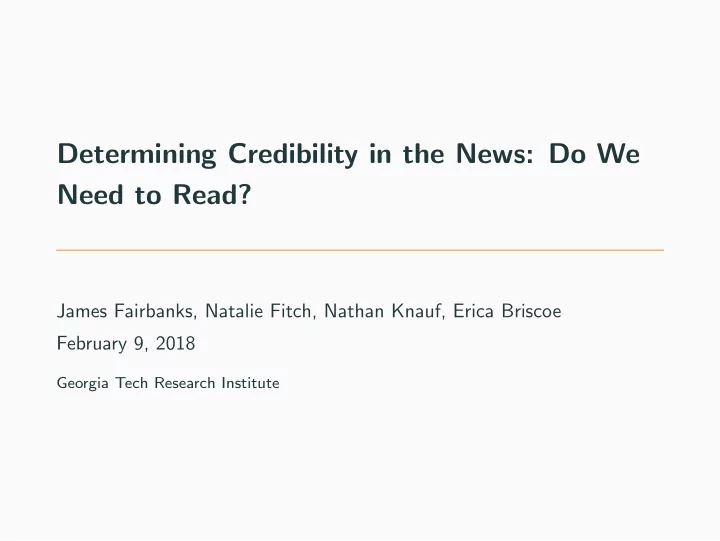

Determining Credibility in the News: Do We Need to Read? James Fairbanks, Natalie Fitch, Nathan Knauf, Erica Briscoe February 9, 2018 Georgia Tech Research Institute
Outline Introduction Methodology Results Conclusions jpfairbanks.com/mis2-2018 James Fairbanks, Natalie Fitch, Nathan Knauf, Erica Briscoe 2
Fake News Flavors jpfairbanks.com/mis2-2018 James Fairbanks, Natalie Fitch, Nathan Knauf, Erica Briscoe 3
Fake News and the Modern Web • Motive : Clickbait revenue streams and political campaign funding incentivizes low quality articles to attract readers • Means : The democratization of online media allows anyone to setup a website and publish unadjudicated content • Opportunity : Social media provides huge platforms for attracting clicks jpfairbanks.com/mis2-2018 James Fairbanks, Natalie Fitch, Nathan Knauf, Erica Briscoe 4
Our Approach jpfairbanks.com/mis2-2018 James Fairbanks, Natalie Fitch, Nathan Knauf, Erica Briscoe 5
Bias Detection Humans can pick up on nuanced but powerful signals of bias in terms of semantics, sentiment (tone) and content . jpfairbanks.com/mis2-2018 James Fairbanks, Natalie Fitch, Nathan Knauf, Erica Briscoe 6
Content Model Figure 1: Content Model Pipeline jpfairbanks.com/mis2-2018 James Fairbanks, Natalie Fitch, Nathan Knauf, Erica Briscoe 7
Credibility Assessment: Fake or Not Fake? jpfairbanks.com/mis2-2018 James Fairbanks, Natalie Fitch, Nathan Knauf, Erica Briscoe 8
When words are not enough. . . Source: HillaryDaily.com • New Book Reveals That Obama Pushed Hillary to Concede in 2016 Election • 2016 Democratic Presidential Candidate Blasts Media for Being Against Trump “Right from the Beginning” • Michelle Obama: If I Ran Against Trump I Would Have Beaten Him Easily! • Kellyanne Conway Shuts Chelsea Clinton Down: “You Lost the Election” • Former President Obama Spotted Partying in Caribbean with Billionaire • Trump Admin Says Pakistan May Be Next Country He Includes in Ban jpfairbanks.com/mis2-2018 James Fairbanks, Natalie Fitch, Nathan Knauf, Erica Briscoe 9
Structural Method Figure 2: Structural Method Pipeline jpfairbanks.com/mis2-2018 James Fairbanks, Natalie Fitch, Nathan Knauf, Erica Briscoe 10
Structural Method: Graph Creation HTML Tag Description Mutually linked sites (text content) <a> Shared CSS (visual style) <link> Shared JavaScript files (user interaction) <script> Common images, logos, or icons (visual content) <img> Table 1: Link Types used in Graph Construction • An undirected and unweighted graph was constructed using link structure from 19,786 domains (nodes) with 32,632 links (edges) jpfairbanks.com/mis2-2018 James Fairbanks, Natalie Fitch, Nathan Knauf, Erica Briscoe 11
Structural Method: Belief Propagation BP is an iterative semisupervised method based on: • Node potential: φ ( x i ) “ a priori belief of node i ’s assignment” • Edge potential: ψ ( x i , x j ) “probability node j in class x j given node i in class x i ” ψ ij ( x i , x j ) x i x j x i 1- ǫ ǫ x j 1- ǫ ǫ • Nodes pass messages: m ij ( x j ) “node i ’s belief about node j belonging to class x i ” m ij ( x j ) ← � x i ǫ X φ ( x i ) ψ ij ( x i , x j ) � k ǫ N ( i ) / j m ki ( x i ) • Compute Posterior: b i ( x i ) b i ( x i ) = k φ ( x i ) � x j ǫ N ( i ) m ji ( x i ) jpfairbanks.com/mis2-2018 James Fairbanks, Natalie Fitch, Nathan Knauf, Erica Briscoe 12
Experiments: The GDELT Database Contains events extracted from online news sources and includes: • two actors • the action • source url • geographic information • temporal information We augment GDELT with text and links from news sources jpfairbanks.com/mis2-2018 James Fairbanks, Natalie Fitch, Nathan Knauf, Erica Briscoe 13
Experiments: Media Bias Fact Check • Rubric based ratings for domains for 4 categories: • Biased wording/headlines • Factual/Sourcing • Story Choices • Political Affiliation/Endorsement Figure 3: Volunteer run fact checking site • Labels are converted to binary mediabiasfactcheck.com labels for classification jpfairbanks.com/mis2-2018 James Fairbanks, Natalie Fitch, Nathan Knauf, Erica Briscoe 14
Results • Content problem used textual information from 124,300 articles from 242 domains • Structural problem used link information from 19,786 domains (nodes) and 32,632 links (edges) Bias Credibility Model Content 0 . 926 0 . 358 Structure 0 . 931 0 . 889 Table 2: Test Set AUC for Bias and Credibility problems. While content is sufficient to detect bias, structure is required to detect fake news. jpfairbanks.com/mis2-2018 James Fairbanks, Natalie Fitch, Nathan Knauf, Erica Briscoe 15
Conclusions • We can discover and combat propaganda with structural analysis of the web, which leverages informative features ignored in linguistic models • Text based models are less effective for credibility because of changing topics of fake news • Future research should focus on: • Combining article link structure with traditional NLP textual features • Current method is vulnerable to large connected components without any labels. • Extracting links from the text ”according to AP” jpfairbanks.com/mis2-2018 James Fairbanks, Natalie Fitch, Nathan Knauf, Erica Briscoe 16
Recommend
More recommend